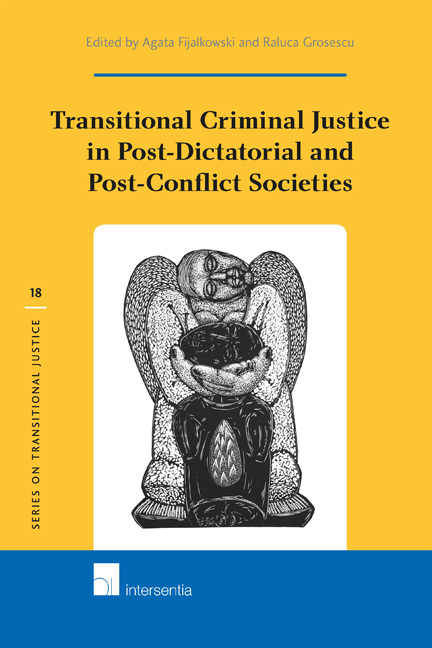Book contents
- Frontmatter
- Contents
- Introduction
- PART I CRIMINAL JUSTICE AS A METHOD OF DEALING WITH THE PAST: OPPORTUNITIES, STRATEGIES, AND LEGAL AND POLITICAL CONSTRAINTS
- PART II UNIVERSAL PRINCIPLES V LOCAL PECULIARITIES: THE RELATIONSHIP BETWEEN NATIONAL JURISDICTIONS AND INTERNATIONAL LAW
- Chapter 7 International Politics of Justice: The Political Underpinnings of the Emergence of an International Regime
- Chapter 8 Positive Complementarity: Fine-Tuning the Transitional Justice Discourse? The Cases of the Democratic of Congo, Uganda and Kenya
- Chapter 9 Punishing Mass Atrocities: Penological Developments in the Aftermath of the Rwandan Genocide
- Chapter 10 International and National Legal Assessment of Crimes Committed by the Communist Regimes: Lithuanian Case Study
- Chapter 11 Conclusions
- About the Authors
Chapter 9 - Punishing Mass Atrocities: Penological Developments in the Aftermath of the Rwandan Genocide
from PART II - UNIVERSAL PRINCIPLES V LOCAL PECULIARITIES: THE RELATIONSHIP BETWEEN NATIONAL JURISDICTIONS AND INTERNATIONAL LAW
Published online by Cambridge University Press: 28 November 2017
- Frontmatter
- Contents
- Introduction
- PART I CRIMINAL JUSTICE AS A METHOD OF DEALING WITH THE PAST: OPPORTUNITIES, STRATEGIES, AND LEGAL AND POLITICAL CONSTRAINTS
- PART II UNIVERSAL PRINCIPLES V LOCAL PECULIARITIES: THE RELATIONSHIP BETWEEN NATIONAL JURISDICTIONS AND INTERNATIONAL LAW
- Chapter 7 International Politics of Justice: The Political Underpinnings of the Emergence of an International Regime
- Chapter 8 Positive Complementarity: Fine-Tuning the Transitional Justice Discourse? The Cases of the Democratic of Congo, Uganda and Kenya
- Chapter 9 Punishing Mass Atrocities: Penological Developments in the Aftermath of the Rwandan Genocide
- Chapter 10 International and National Legal Assessment of Crimes Committed by the Communist Regimes: Lithuanian Case Study
- Chapter 11 Conclusions
- About the Authors
Summary
What is and what should be the purpose of punishing international crimes? How can criminal sanctions pursue these goals? How should mass atrocities be punished? Should they be addressed differently from ordinary crimes and from context to context? The limited engagement of both scholarly literature and case law of national and international bodies with these topics to a large extent has left these issues unresolved. This frustrates the efforts carried out by national and international actors to set up mechanisms aimed at preventing, repressing and punishing international crimes. In recent years scholars have paid a greater attention to the mentioned paradoxes, by contributing to the development of a criminology, penology and victimology of mass atrocities. The aim of this chapter is twofold and involves shedding light on such efforts, while simultaneously critically testing the consistency of the proclaimed goals of institutions delivering international criminal justice with their sentencing practice. The analysis is based in particular upon the sentencing of national, international and ‘neo-traditional’ institutions set up to provide post-genocide justice in Rwanda. Finally, the chapter argues that punishment of mass atrocities should be both culture- and context-sensitive in order to take into account the root causes of fratricidal violence.
INTRODUCTION
In order to provide a response to the chain of mass atrocities which have marked the twentieth century, new categories of crimes have been elaborated. The necessity to include within the realm of legal precepts criminal conducts which ‘exploded the limits of the law’ is testified by the development of legal language. International lawmakers in the twentieth century have fought to curb extreme evil through legal norms. Consequently, the progressive development of international criminal law, coupled with the blossoming of national, hybrid and international tribunals charged with prosecuting mass atrocities, has attracted the attention of scholars and human rights practitioners. Surprisingly, however, as stressed by Drumbl, the reflection addressing criminology, victimology and penology of international crimes is embryonic. Research devoted to how and why gross human rights violations have to be repressed and punished, remains relatively underdeveloped compared to other fields.
- Type
- Chapter
- Information
- Publisher: IntersentiaPrint publication year: 2015



